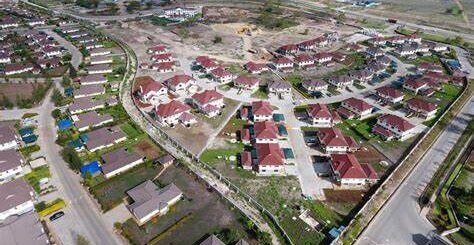Private Land Ownership in Kenya: A Comprehensive Guide to Land Laws and Processes

 Introduction to Private Land Ownership in Kenya
Introduction to Private Land Ownership in Kenya
Private land ownership is a significant aspect of Kenya’s real estate landscape, offering individuals and entities the opportunity to own, develop, and utilize land for various purposes. Understanding the laws, processes, and requirements for private land ownership is essential for anyone looking to invest in Kenyan property. This comprehensive guide delves into the intricacies of private land ownership in Kenya, covering the types of land tenure, the legal framework, the role of land documents, and the steps involved in acquiring and transferring private land.
Understanding Private Land Ownership
Private land ownership refers to the legal right of individuals or entities to own and use land exclusively. In Kenya, private land can be owned in different forms, including freehold and leasehold tenure. These forms of ownership come with specific rights and obligations, as outlined in Kenyan law.
Freehold Tenure
Freehold tenure, also known as absolute ownership, grants the landowner complete and indefinite ownership of the land. This means the owner has full rights to use the land for any lawful purpose, transfer ownership, lease, or develop the property without time restrictions. Freehold land is commonly found in rural areas and some urban settings.
Leasehold Tenure
Leasehold tenure involves the ownership of land for a specified period, typically 99 years, after which the lease can be renewed. Under this arrangement, the government or local authorities retain ownership of the land but lease it to individuals or entities for the lease period. Leasehold properties are prevalent in urban areas where the government holds significant portions of land.
Legal Framework Governing Private Land Ownership
Several key pieces of legislation govern private land ownership in Kenya. These laws provide the framework for land administration, registration, and dispute resolution, ensuring transparency and security in land transactions.
The Constitution of Kenya 2010
The Constitution of Kenya 2010 is the supreme law that outlines the principles of land ownership and management. It emphasizes equitable access to land, sustainable land use, and the protection of land rights. The Constitution also establishes the National Land Commission (NLC), tasked with managing public land on behalf of the national and county governments.
The Land Act 2012
The Land Act 2012 governs the management and administration of land in Kenya. It provides the legal framework for land registration, leasing, and transfer of land. The Act also outlines the procedures for compulsory acquisition of land by the government for public purposes and the principles of land valuation and compensation.
The Land Registration Act 2012
The Land Registration Act 2012 regulates the registration of land and property in Kenya. It establishes the process for registering land titles, leases, and other interests in land. The Act aims to streamline land registration procedures and ensure the accuracy and reliability of land records.
The National Land Commission Act 2012
The National Land Commission Act 2012 establishes the National Land Commission (NLC), which oversees the management and administration of public land. The NLC is responsible for allocating public land, investigating land-related disputes, and ensuring compliance with land laws and policies.
The Community Land Act 2016
The Community Land Act 2016 provides the legal framework for the recognition, protection, and registration of community land rights. It outlines the procedures for the registration of community land, dispute resolution, and the management of communal land resources.
Role of Land Documents in Private Land Ownership
Land documents play a critical role in establishing and transferring land ownership in Kenya. These documents provide legal proof of ownership, outline the terms of transactions, and protect the rights of landowners. Key land documents include:
Title Deed
The title deed is the most important document in land ownership. It serves as legal proof of ownership and indicates that the holder has the right to use and transfer the land. Title deeds can be freehold or leasehold, depending on the type of tenure. Ensuring that the title deed is genuine and up-to-date is crucial for securing land rights.
Land Search Certificate
A land search certificate is obtained from the Ministry of Lands and provides information about the current ownership, size, and any encumbrances or legal issues associated with the property. Conducting a land search is essential to verify ownership and ensure that the land is free from disputes.
Sale Agreement
The sale agreement is a legally binding contract between the buyer and the seller, outlining the terms and conditions of the land transaction. It includes details such as the purchase price, payment schedule, and contingencies. The sale agreement should be drafted by a qualified lawyer to ensure compliance with Kenyan law.
Transfer of Title
The transfer of title is the process of changing the ownership of the land from the seller to the buyer. This involves submitting the necessary documents to the Ministry of Lands, including the signed sale agreement, the original title deed, and a duly filled transfer form. The transfer must be registered with the relevant land registry, and the buyer will receive a new title deed in their name once the process is complete.
Land Control Board Consent
For agricultural land transactions, obtaining consent from the Land Control Board (LCB) is mandatory. The LCB ensures that the sale complies with local land use policies and regulations. Both the buyer and seller must appear before the board to seek approval for the transaction.
Clearance Certificates
Several clearance certificates may be required during the land purchase process. These certificates confirm that the property is free from outstanding taxes, rates, and other liabilities. Common clearance certificates include the land rates clearance certificate and the land rent clearance certificate.
Process of Acquiring Private Land in Kenya
Acquiring private land in Kenya involves several steps, each requiring specific land documents. Here’s a detailed overview of the process:
Conduct a Land Search
Before purchasing land, it is essential to conduct a land search at the Ministry of Lands. This process involves verifying the authenticity of the title deed, checking for any encumbrances, and confirming the current ownership of the property. The land search certificate provides crucial information that helps prevent potential legal issues.
Draft and Sign a Sale Agreement
Once the land search is complete and the property is confirmed to be free from disputes, the buyer and seller can proceed to draft a sale agreement. This document outlines the terms and conditions of the sale, including the purchase price, payment schedule, and any contingencies. It is advisable to have the sale agreement drafted and reviewed by a qualified lawyer to ensure legal compliance.
Obtain Land Control Board Consent
For transactions involving agricultural land, obtaining consent from the Land Control Board (LCB) is mandatory. The LCB reviews the sale to ensure it complies with local land use policies and regulations. Both the buyer and seller must appear before the board to seek approval for the transaction.
Transfer of Title
The transfer of title is the process of changing the ownership of the land from the seller to the buyer. This involves submitting the necessary documents to the Ministry of Lands, including the signed sale agreement, the original title deed, and a duly filled transfer form. The transfer must be registered with the relevant land registry, and the buyer will receive a new title deed in their name once the process is complete.
Obtain Clearance Certificates
Before the transfer of title can be registered, several clearance certificates must be obtained. These include the land rates clearance certificate and the land rent clearance certificate. These certificates confirm that the property is free from outstanding taxes, rates, and other liabilities.
Registration of the Transfer
The final step in acquiring private land is registering the transfer with the Ministry of Lands. This involves submitting the necessary documents, including the signed sale agreement, transfer form, and clearance certificates. Once the transfer is registered, the buyer will receive a new title deed in their name, officially completing the transaction.
 Importance of Accurate Land Records
Importance of Accurate Land Records
Maintaining accurate land records is crucial for preventing and resolving land disputes. Accurate records ensure that land ownership is clearly documented, boundaries are well-defined, and transactions are legally recorded. The Ministry of Lands and local land registries are responsible for maintaining and updating land records in Kenya. Property owners should ensure that their land documents are up-to-date and accurately reflect their ownership and property details.
Challenges in Private Land Ownership
Private land ownership in Kenya, while offering significant opportunities for investment and development, is not without its challenges. These challenges can stem from various legal, bureaucratic, and practical issues that can complicate the process of acquiring, maintaining, and developing land. Understanding these challenges is crucial for potential landowners to navigate the complexities and protect their investments effectively.
Lengthy Legal Processes
One of the primary challenges in private land ownership in Kenya is the lengthy legal processes involved in land transactions and dispute resolution. The backlog of cases in the Environment and Land Court, as well as other legal bodies, can result in significant delays. These delays can be frustrating for landowners and may hinder timely development or resolution of disputes.
The judicial system, while robust, often struggles with inefficiencies that prolong the time required to resolve land-related cases. This can be particularly problematic in situations where quick resolution is essential, such as in cases of disputed ownership or when development projects are on hold pending legal clearance.
Legal and Bureaucratic Complexities
Navigating the legal and bureaucratic complexities of land ownership in Kenya requires significant expertise and persistence. The process of acquiring land involves multiple steps, each with its own set of legal requirements and documentation. Ensuring that all necessary land documents, such as title deeds, land search certificates, and sale agreements, are in order is a meticulous task.
Additionally, understanding and complying with zoning regulations, land use policies, and environmental standards can be challenging. These regulations can vary significantly depending on the location and intended use of the land. Failing to adhere to these regulations can result in legal penalties and complications in the development process.
Corruption and Fraud
Corruption and fraud are significant challenges in the Kenyan land sector. Issues such as fraudulent land sales, forged documents, and bribery can undermine the legal process and complicate land transactions. Corrupt practices can lead to multiple claims of ownership on the same piece of land, creating legal disputes that are difficult to resolve.
To mitigate these risks, it is essential to work with reputable professionals, including lawyers, surveyors, and real estate agents. Conducting thorough due diligence and verifying the authenticity of land documents through official channels can help protect against fraudulent activities.
Disputes and Conflicts
Land disputes and conflicts are common in Kenya, often arising from unclear boundaries, conflicting ownership claims, and illegal land occupation. These disputes can involve individuals, families, communities, and even government entities. Resolving land disputes legally is crucial to protecting property rights and maintaining order in land ownership and use.
The process of resolving land disputes can be complex and time-consuming, involving multiple parties and legal proceedings. Alternative Dispute Resolution (ADR) methods, such as mediation and arbitration, can provide a more efficient and amicable way to resolve disputes, but they require cooperation and willingness from all parties involved.
Incomplete or Inaccurate Land Records
Maintaining accurate land records is essential for preventing and resolving land disputes. However, incomplete or inaccurate land records can create significant challenges. In some cases, land records may be outdated, missing, or improperly maintained, leading to confusion and legal complications.
Efforts to digitize and modernize land records in Kenya are ongoing, but challenges remain in ensuring that all records are accurate and up-to-date. Property owners must ensure that their land documents are accurately recorded and regularly updated to reflect any changes in ownership or land use.

Private Land
Environmental and Regulatory Challenges
Environmental considerations play a crucial role in land ownership and development. Ensuring that land use complies with environmental regulations is essential for sustainable development. However, navigating these regulations can be challenging, particularly for large-scale projects that require environmental impact assessments and adherence to stringent standards.
In addition to environmental regulations, other regulatory challenges include obtaining necessary permits and approvals for development, adhering to building codes, and complying with local land use policies. These regulatory requirements can vary significantly depending on the location and type of development, adding complexity to the process.
Accessibility and Infrastructure
Access to land and infrastructure development can pose challenges, especially in rural or underdeveloped areas. Ensuring that land is accessible via roads and has access to essential services such as water, electricity, and sanitation is crucial for development. However, in some regions, infrastructure may be lacking or inadequate, requiring significant investment and planning.
Financial Constraints
While not directly related to legal or bureaucratic challenges, financial constraints can impact private land ownership. The high cost of land, particularly in prime areas, can be a barrier for many potential buyers. Additionally, securing financing for land acquisition and development can be challenging, particularly for small-scale investors or those without established credit histories.
Conclusion
Private land ownership in Kenya offers significant opportunities for investment and development, but it also requires navigating a complex legal framework and ensuring that all land documents are in order. Understanding the types of land tenure, key legislation, and the role of land documents is crucial for anyone involved in land transactions. Acquiring private land involves several steps, from conducting a land search to registering the transfer of title, each requiring specific documents and legal procedures.



